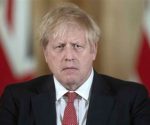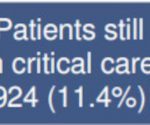Ending Government-by-hoax by killing its perception shaping capability is eminently possible, continuing death of BBC demonstrates
There is little to say about the declaration by UK Government of an nth level system of tiers for controlling a “mutant strain” of “Covid-19”, except that it is yet another psyop, this time where the UK Government’s counterparts in the international rules based (new world) order assist by announcing border closures, real or not. We should note, it would not be French authorities preventing lorries loading onto ships at Dover, and it would not be French authorities creating an opportunity for media to broadcast lines of traffic waiting to leave Britain as if the country were completely blockaded.
In this case, as in all the others, the UK Government declares something to be true, either directly or through one of its aspects (usually the corporate-media [reinforced by ancillary controlled alternative media, which supports the “reality” from a point of view of opposition]), and hence it is true, even though it has no faint resemblance to any truth. This is what, at FBEL, is termed government-by-hoax, and it is how UK Government perpetually operates.
Now, in the particular case of how UK Government has conducted psychological operations during the course of the Covid-19 hoax, there is little variation to the norm, because the UK Government always treats the British people as if one that is militarily occupied. However, there is also an element of open waged war about the situation, because the UK Government is in an economic conflict against a good deal of the people it governs, and so, just as in any war, it will produce propaganda material to induce a psychological effect in the people it wants to mobilise to do its fighting. Indeed, in any war it wages, the bulk of propaganda will be aimed toward people who have allegiance to UK Government – often misapprehended as having allegiance to the country that it squats upon – or who are looking to be obedient to UK Government. There is no point propagandising an enemy if one’s own side doesn’t want to do any fighting.
At FBEL, it has often been explained how UK Government has acted during the Covid-19 hoax to keep people on the plantation. This is to say that it has executed psychological operations to keep people on its side. There is always in this mode of operability, a feature whereby UK Government is acting not out of strength, but of weakness, because it is on the back foot against an erosion of trust caused by inevitable revelation of method. This disadvantage is a problem that is not hard to overcome when there is a Hitler presented as a hate figure to an unsophisticated population, and where, as a result, the population is mostly willing to abide with UK Government, and indeed to be extremist with it, and therefore ruthlessly self-police diktat for conformity of behaviour and suppression of truth.
Nowadays, however, telling a people who are aware of the role of military intelligence acting upon them to join a fight against an enemy that is a construct of UK Government itself does not cut the mustard. Thus, the UK Government operates out of a position of a lot of weakness.
On a few occasions in recent FBEL articles, the UK Government through its media aspect has been referred to as Panem Capitol. This is a reference to the administrative centre, and the presentation of itself, of a dystopian country portrayed in the children’s literature made into films, The Hunger Games. The idea being conveyed is that, as a device for oppression, UK Government’s media aspect will always impress its consumers with the unfailing confidence of UK Government – except when a plan is in effect whereby the people are being expected to vote out an incumbent executive branch. Moreover, UK Government agenda will always be presented in a positive light; if it ever seems at odds with the purpose of an executive, then this will be tricks to bring people to support that agenda.
So corporate-media is an aspect of UK Government that teaches that UK Government is inevitable, although at the same time that its agenda is born out of circumstances over which there is no control – when in truth the latter could not generate the former.
As much as people are beginning to understand that the agenda is fixed, and that circumstances are engineered to bring it about, there must also be an understanding that UK Government is not all powerful. It regularly fails. For instance, if the Pfizer vaccination roll out in the UK was not the terrible anti-climax that it was, then there would no need for the mutant virus and border chaos episode as means of reinforcing an impression of danger.
So, it is quite clear, to save it from its regular failure, the most important weapon in UK Government’s armoury is corporate-media, of which there are flagship propaganda outlets being the biggest guns. As such, anyone looking to overthrow UK Government, and end government-by-hoax, should wage war against the BBC. This doesn’t mean quibbling with it about its bias, and pleading with UK Government for alteration and restitution, but to have it completely rejected, and bereft of its financial resources. As it happens, although there is a long way to go in it, the BBC is losing such a war, as has been reported in these pages from time to time. Needless to say, it is an important service to convey this information, because it ultimately demonstrates that UK Government is weak, and can be beaten.
In this latest report about the BBC’s increasingly perilous state, all the data referred to comes from the BBC Group Annual Report and Accounts 2019/2020, and from the Television Licence Fee Trust Statement for the Year Ending 31 March 2020.
Off the bat, that the BBC sold 256,000 less TV licences in 2019/20 than it did in 18/19 is a serious problem. A decline in the sales of the licence started in 2018/19, when only 37,000 less were sold than in the previous annual period. Before that, there had been a regular rise in sales, at least since 2013/14 (which is where the range starts in a graph produced by the BBC, and thus is the earliest data immediately to hand for us). In that year, 25,478,000 licence fees were sold. In 2019/20, there were only 193,000 more (25,671,000). As we will see, according to the BBC’s own expectations, this just will not do.
In 2020/21, which the BBC acknowledges will be a tough year because i) subsidised licences for over-75s ended completely in August (expect for those on pension credit), and ii) licence collection has not been fully operational for the sake of maintaining the appearance of a fake pandemic, licence fee sales will be less again, and perhaps will fall below the 2013/14 figure. A serious failure indeed. In a previous FBEL article in this loose series [search for “BBC”], it was reasoned that a trend of 200,000 less licence fees sold each year would mean a million less active licences by 2023, and that it would be a disaster for the BBC.
The issue is one of what the BBC calls evasion: anyone who hasn’t got a licence is presumed to be in need of one, even if they contact the licensing company to claim that they don’t. This is how it works. At the end of March 2020, the evasion rate was 7.25%, up from 6.57% at the same time the year before. The yearly average rate of evasion was 6.95%, up from the 6.69% of the previous annual period. It should be pointed out that the annual average appears to be a new way of reporting a measure of evasion rate. Indeed, the BBC has apparently adopted a new methodology for calculating evasion, which is very interesting to discover: changing the way of taking measures, because the measurements are not to one’s liking, is the stuff of Soviet tractor statistics.
It all boils down to a loss of £170 million in revenue from licence fee sales, from £3,690 million in 18/19, to £3,520 million this time. Of course, 35 hundred million looks such a large figure that a mere 2 hundred million lost from it appears a drop in the ocean in contrast, but one must remember that licence fee revenue did not cover the BBC’s operational costs in 2019/20, nor in the previous year either. The BBC saw a spending deficit of £119 million in 2019/20 (from £69 million the previous year). This was despite a more than 300% increase in revenue raised by sale of assets (£118m vs £36m), which evidently is to be explained by the full acquisition of UKTV as reported in previous articles (in order to sell parts of it off?).
The full ownership of UKTV could also explain the increase in revenue created from commercial activity (initially from advertising, perhaps), up to £1,423 million from £1,199m, but it is this figure that is the actual drop in the ocean. This £224 million increase was all but wiped out by the loss in licence fee sales, and the BBC is never going to prosper from its commercial assets if they are only ever making up for licence fee losses, and not consolidating that revenue. Indeed, it’s not only the BBC who have a problem with continuing to be commercially viable while trying to politicize its entertainment output, which is undeniably what has been happening across the board in the English speaking world (see Hollywood in particular). However, to continue to focus on the BBC, it has an inherent problem in a free market more than most when it is readily identified as being politically biased because of its news and current affairs service. In other words, the BBC faces the problem of a share of the market that is determinedly set against it: or, how people don’t want what the BBC is selling. It is reality such as this that explains the adoption of UKTV to serve as a disguise for commercial activity.
While commercial revenue might be a drop in the ocean, the BBC still fully expects to suffer for its diminishing in the next year; it’s all thanks to the need to maintain an appearance of a fake pandemic so that content has been difficult to make given the restrictive circumstances:
Now the severe impact of the coronavirus crisis on our commercial operations, along with the delayed introduction of our new over-75s’ scheme and hit to our licence fee income, has led to a substantial shortfall. It means we have had to set a new, additional, savings target for the current year of £125 million, with more to come next year. That is on top of the challenge of reaching the significant savings we had long factored into our financial plans for 2020/21, in a tougher than ever market environment. In this context, the question of how the BBC can maximise its commercial revenues becomes even more pressing.
There will be an explanation about the meaning of “savings” momentarily; the point to make is how here is recognition of the scale of the problem for the BBC when it generally has less revenue to make commercially successful programmes. While the BBC won’t acknowledge it, this is further compounded by the fact that the BBC cannot help but propagandise in its output. In short, while the BBC clearly pins its hopes on being commercially successful, it is perhaps a completely unrealistic expectation.
“Savings” are one of the three ways that the BBC hopes to avoid “a negative impact on services and the scope of what the BBC will be able to offer”. The other two are sustained licence fee income, and returns from commercial entities. But the brutal truth is that everything follows from good or bad licence fee revenue. Even if the commercial revenue improved by good percentage increases, it still would not even barely support the BBC’s current output, let alone its ambitions. Commercial revenue looks as if it can never be more meaningful than being a stopgap for loss of licence fee income. As for the BBC’s saving initiatives, they are not actually about not spending money as the name implies, but they are about choices in spending – as one quickly realises when reading this:
The reduction in licence fee income is partially offset by reduced Public Service expenditure and improved performance in our commercial subsidiaries…
We have continued to invest in high quality content and our digital services by expanding the availability of programmes on iPlayer and BBC Sounds. This investment is funded by ongoing savings plans. This year, our Public Service content spend decreased by 3% to £2,777 million due to major sporting events in the prior year.
There is an issue arising in this regarding the BBC sacrificing public services in order to make itself commercially attractive, but this is not a problem as far as we are concerned: BBC output is universally corrosive, and there is no cultural value in its public service content. The point being made is that the range of BBC output is directly affected by licence fee losses. Moreover, not only do the losses make the BBC have to take risks, it means that the BBC has to move away from being a producer of content that justifies public funding, further undermining its claim to benefit from a tax. And what the risk-taking means for the BBC is clear: while there may be a limited audience for public service broadcasting, commercial television is never guaranteed bigger audiences, but funding for the latter is never assured.
That the BBC is so very reliant on the licence fee actually makes a mockery of the following claim:
We have accomplished a vast amount to make the BBC simpler, leaner, and more efficient and will continue to do so in the future. Since 2016/17, we have delivered £618 million of cumulative savings and in 2020/21 we are projecting our savings total to rise above £800 million.
This is interesting, because the BBC had been hoping to reduce the evasion rate to just under 6% (or 5.9%, as it sometimes expressed) by March 2021, and it was estimated in 2018 that in order to meet the target, it would have to sell licences to an additional 280,000 households relative to the 2016-17 baseline (reference).
So, what we are seeing, in the years from 2016 to 2021, is the BBC making efficiency choices regarding the spending of more than £800 million (undoubtedly a course embarked upon to contend with the end of the over-75s subsidy). If we are to understand correctly, this is nearly a billion spent taking the risk on losing the right to be a public service content provider and seen as being a justifiable recipient of tax money. The hoped for outcome that would pay the BBC back, however, has not materialised; we can say with a good deal of certainty that the 26,210,000 active licence fees is a target that it not going to be met.
While we can extrapolate the fact from the continuing trend of less licence sales, it is also to be firmly understood from the reporting in The Times in November, and after the end of the BBCs over-75 concession in August, that, at that time, 1.4 million over-75s had not paid for a licence. It is also known that the BBC is incredibly wary about realising the revenue out of the very bad optics it would create (that this would be the case was a thing discussed here previously); from a November Daily Express report, where 1.3 million were still to pay, it was claimed that no enforcement against over-75s was taking place.
To say it is all going wrong for the BBC is an understatement. Frankly, things are unravelling for the corporation, and it is down to people who would not pay the licence fee in 2017, 2018, 2019, and 2020. Although they will probably not have thought about it, that the end of the subsidisation was occurring at the same time, it was a devastatingly optimal time to not pay the tax.
The BBC’s concern might, as usual, be wrapped up in guarded language, but it is there to be detected nevertheless. Believe it or not, a statement about viability in the reports of 2019/20 is more pessimistic than the one of a previous year that [also] explained how the BBC “has a reasonable expectation that the Corporation will be able to continue in operation”:
Taking account of the BBC Group’s current cash position, the implementation of the new income policy for over-75 licences, principal risks and the aforementioned sensitivity analysis, the Board has a reasonable expectation that the Corporation will be able to continue in operation and meet its liabilities as they fall due over the three-year period of the assessment.
Despite the steady measure of it, the statement smacks of someone talking about this week’s budget not knowing if there will be a pay cheque next Friday. This is an uncertainty that can be directly attributed to the BBC not knowing how many people will stop paying the licence fee. In these regards, the BBC cannot see past three years into its future (note well, the BBC has cancelled the latest attempt to create “business critical systems for collection of the licence fee” of the sort that had to be postponed in 2016 [as discussed here], and later abandoned), and this is thanks to real grass roots action by individuals, and proof that a body of like-minded, even unorganised people, by doing the simple thing of living in their liberty, can kill Government.



















It’ll be interesting to see if EU funds continue to trickle in to aunties coffers. That will signal a real brexit. All the very best for the rest of this year and next. Many thanks